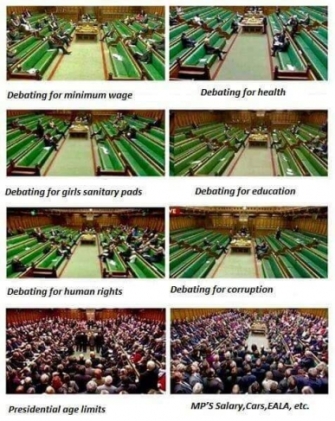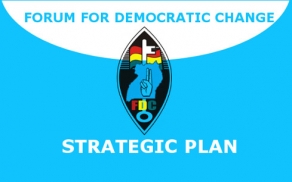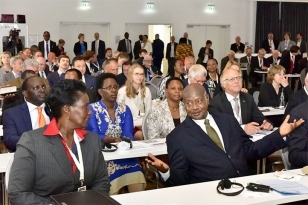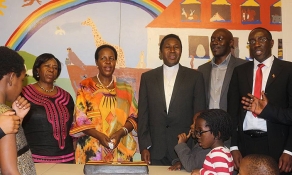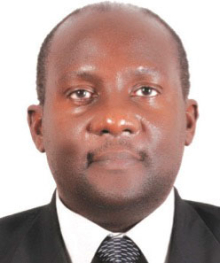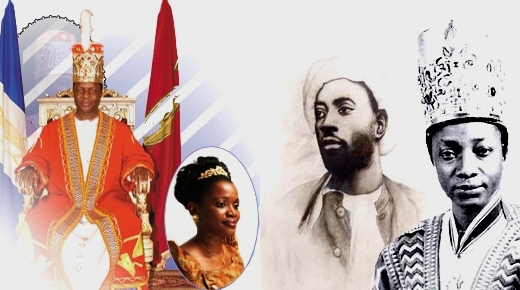A pregnant woman was about to deliver in her car along Yusuf Lule Road near Garden City following traffic gridlock that has left most parts of Kampala city in chaos.
The woman identified as Barbra Namatovu said she was, together with her husband, heading to hospital to deliver a baby but got trapped in the traffic chaos for more than an hour.
Namatovu was being driven by her husband who told this reporter that they found it difficult to even pull out of the jam and take a different route.
On Friday evening, motorists in Kampala were left cursing after traffic Police department withdrew their officers from the city roads following media reports that they are the cause of traffic jam on most roads in Kampala.
The traffic Police boss, Mr Stephen Kasima, said they had withdrawn from all traffic light junctions to let the traffic lights manage the city.

A lorry truck that was about to catch fire before the occupants jumped out and poured water on the engine. PHOTO BY FRANKLIN DRAKU
The officers were redeployed at all non-traffic light junctions in the city as an experiment to determine if they are the problem, which seems to be the perception by some members of the public.
They want motorists to figure out whether there will be traffic order without traffic Police officers being stationed on the roads.
For now, citizens have taken on the duty to direct traffic.
Amid the traffic chaos along Yusuf Lule road, some Police officers were seen trying to force motorists to pave way for the minister of lands but all was in vain as no car could move an inch.
An unidentified lady on a boda boda also lost her phone to suspected thugs commonly known as kifesi.
A tipper truck was also about to catch fire when its engine overheated near Golf Course hotel. Its occupants jumped out and started pouring water on the engine.

Motorists stuck in traffic gridlock along Yusuf Lule Road near Fairway Hotel in Kampala. PHOTO BY FRANKLIN DRAKU
At Fairway roundabout, it was a total lockdown by 8pm. Although traffic lights were changing, vehicles were immobile as there was no space to move.
At Acacia Avenue at about 8:30pm, a few traffic officers who were on the road were seen plucking off number plates from suspected traffic offenders' cars.
Some of the most affected roads include Mukwano road in Industrial Area, Jinja road roundabout near Kitgum House, Spear Motors-Nakawa junction, Bwaise junction- Mambule Road and Nakulabye junction, especially Sir Apollo Kaggwa Road, among others.
This comes just days after the Kampala Capital City Authority (KCCA) executive director, Ms Jennifer Musisi, said that KCCA had invested a lot of money in traffic lights to save people from traffic jams, but traffic police were hindering their operation by overruling them.

M/s Jennifer Musisi trying to manage the urban planning of the expanding international city of Kampala
Ms Musisi’s assertion during the mid-term review of the institutional infrastructure development on Wednesday is supported by Operation Wealth Creation chairman, Gen Salim Saleh.
Gen Saleh, while meeting members of the Police Advisory Committee at Namunkekeera in Kapeere, Nakaseke District recently, said the biggest challenge to investors in the city is traffic jam.
“We are wasting a lot of money in traffic jams. This is the biggest problem in Kampala. I wanted the director of traffic police, Dr Stephen Kasiima, to study the cause of the problem and address it.”
Kampala Metropolitan Police spokesman, Mr Luke Owoyesigyire, said junctions with traffic lights using old technology are manned by traffic police officers or KCCA traffic warders to control the flow of traffic.
“If we allow the vehicles to move according to the traffic lights on some of these junctions, there will be gridlock in the city. Sometimes the lights don’t correspondent with the events in the city,” he said.
The experience by most motorists on Friday serves to cement Mr Owoyesigyire’s assertion.
Nb
Indeed the urban planning authority is using the backward traffic system operations that have no camera vision!

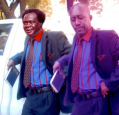
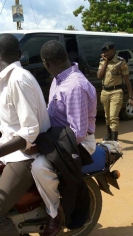

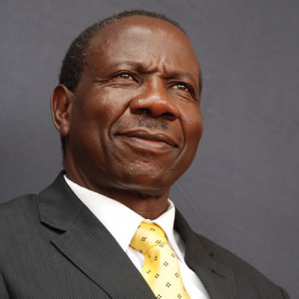

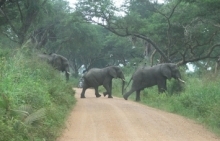
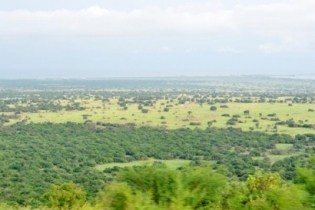


 Okuva ku ddyo: Zephania Dube, akulira ebyemirimu, Arjun Mallik, akulira kkampuni ne Nashiba Nalubega, akulira ebya kitunzi era omwogezi wa kkampuni nga bali mu lukung’aana lw’abamawulireku Pearl of Africa Hotel.
Okuva ku ddyo: Zephania Dube, akulira ebyemirimu, Arjun Mallik, akulira kkampuni ne Nashiba Nalubega, akulira ebya kitunzi era omwogezi wa kkampuni nga bali mu lukung’aana lw’abamawulireku Pearl of Africa Hotel.
